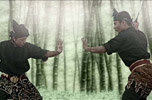Sejarah Wu Shu
Sila baca bagi meyakinkan sejarah Wu Shu adalah khazanah dlm cina beragama Islam sebagaimana disebut dalam sejarah kitab Sri Gayong Panglima Ulung. Harap Maklum.
A Forgotten Legend...
Grandmaster Wang Zi Ping, nicknamed Yon An was a Muslim from the town of Cangzhou in the province of Hebei. He belongs to the Hui family of Wu Shu masters, trained from childhood under the guidance of older relatives. In 1928, he was made the dean of the Shaolin faculty after the foundation of the Central Institute of National Martial Art in Nanking. He was also the vice chairman of the Chinese Wu Shu Association and advisor to major hospitals across China.
Wang Zi-Ping was born in 1881, during the unsettling time of the last Chinese empire. Early in his life, Wang was a member of an underground revolutionary group known as "The Righteous and Harmonious Fists" during the Boxer Rebellion. This is believed to be resulting from the fact that he had lived most of his life under colonial rule from major European powers. He later became a merchant in Northeast China before serving in the army, training soldiers when the country was in turmoil due to foreign invasions. During his youth, Wang had repeatedly defeated Western boxers who challenged the Chinese to fights. Once, during a challenge, he single-handedly defeated a squadron of foreign military police. During another challenge, he picked up a large millstone and was since then known as the "King of Thousand Pounds".
In these periods, Wu Shu was the Hui identity as no Hui would dare go through life without the rudiments of the 'eighteen fist fighting exercise' and 'eight diagram boxing' etched in his mind and body. Apart from Wu Shu, the Hui were particularly steeped in Sufi disciplines. They belonged almost entirely to the Naqshbandiyya Sufi Order. Hui life was thus a mixture of pitiless labor, harsh training and deep spirituality. Their astonishing ability in Wu Shu is hardly an accident....
Grandmaster Wang Zi Ping passed away in 1973, when he was 93 years old.




































0 comments: